 |
| The Kiss director Bille August with Anne-Katrin Titze: “I just finished a big eight-hour series, The Count of Monte Cristo.” |
Bille August’s The Kiss (Kysset), based on the 1938 Stefan Zweig novel Beware Of Pity, transports us to 1914, when the Great War was a looming threat and not yet a reality. Anton (Esben Smed), a young man eager to re-establish his family honour, wants to join the cavalry and become an officer in the Danish army. During the revealing opening scene, he and his mother (Lone Rødbroe) visit a rich aunt (Lane Lind) in an attempt to convince her to provide the necessary means for Anton to buy a horse and all that goes with a fine military career. Already many of the themes that will haunt him and us are established - his good heart plagued by insecurities, family shame, pride, and guilt.
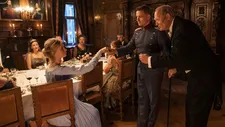 |
| Baron Løvenskjold (Lars Mikkelsen) introducing his daughter Edith (Clara Rosager) to Anton (Esben Smed) |
Private lives and world politics go hand in hand. The elaborately beautiful costumes (Anne-Dorthe Eskildsen also for August’s The Pact about Karen Blixen) and production design (Jette Lehmann) augment the inner turmoil and mystifying workings of love and pity. Decisions big and small and seemingly devilish deals (“You can have anything you desire! Anything!”) reveal the abyss of human capacities.
After helping a car out of the mud with his dragoons during a maneuver by their training barracks near Copenhagen, our hero finds himself invited to the local castle where he encounters unforeseen splendors as well as a group of people who will determine his destiny. Baron Løvenskjold (Lars Mikkelsen) and his daughter Edith (Clara Rosager), who is marked by a riding accident, both take a liking to Anton, which in different ways becomes all-consuming. There is also Edith’s cousin Anna (Rosalinde Mynster) who catches the young man’s eye. Before he knows it, he finds himself a regular guest. When the news of Archduke Franz Ferdinand having been shot in Sarajevo reaches them, everything is about to change.
From Denmark, Bille August joined me on Zoom for an in-depth conversation on The Kiss.
Anne-Katrin Titze: Hello!
Bille August: Hello! I can see you as though you were in my room.
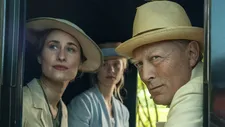 |
| Baron Løvenskjold (Lars Mikkelsen) with his niece Anna (Rosalinde Mynster) and his daughter Edith (Clara Rosager) |
AKT: Great, good to see you again! We talked in 2022 about The Pact. And you told me then that you were editing The Kiss.
BA: Now we speak again. And now it's finished.
AKT: I know, it's been finished for a while. There are some very interesting connections I saw between The Pact and The Kiss. Thematically, both of them have a moment that feels like a deal with the devil.
BA: That's true! What I liked about The Kiss really is that it's about this young guy coming from a kind of poor family, and the only way he can succeed in life is going into the military, and somebody's paying for him. And in the military he's surrounded by upper class soldiers, guys. And then one day he's invited to a castle where he meets the daughter, and the daughter falls in love with him.
But for Anton, the leading character, as a poor soldier he cannot have any kind of relationship with this girl because she's handicapped. It will be such a failure for him, but at the same time he's so conflicted because she does love him. But does he love her, or is it his pity that he's confused with love? And I find that it's a very, very beautiful and complex story and important story to tell.
AKT: Very, very complex. As you were saying, there are two layers. On the one hand, there's the shame that he carries with him from his background. He feels he cannot add more shame, he has to bring honour back to his family. At the same time he feels for her. It's so interesting. There's so much going on.
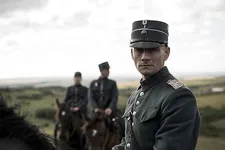 |
| Anton (Esben Smed) on maneuvers in the Danish cavalry |
BA: And, you know, also what I like is the real enemy. If there is an enemy normally in a film, it's some bad guys or some bad, bad thing. But in this story it's empathy. Because a big problem for Anton is that he's a nice human being. He's a sweet boy, and he feels sorry for this girl. So if he was just a tough guy who didn't care about her, he would never have any relationship with her, because he feels sorry for her. He has empathy, which is a big human quality, and that's a big enemy in the film. So I think it also makes it very, very complex and beautiful.
AKT: And his conflict is mirrored in two other men!
BA: Yeah.
AKT: The Baron’s pity that he felt at the last moment, changing his mind about the maid. And his story is being told to us by Dr. Faber, who himself had the same moment of pity. The women don't get that. It's men who have to beware of pity here.
BA: It comes from Stefan Zweig, the writer of the novel, and that for me makes it such a great story. And what I like about this kind of story is that it's very, very clear. The premises of the story is very, very clear, and I think, in order to make a great film, that you have to have strong premises, and of course also a good drama, and I think great writers use the storytelling technique to tell something else, to tell something important. And in this case, obviously, it's about pity and love.
AKT: The ending is even more poignant with the changes you made to the Stefan Zweig novel, where the setting is Austria-Hungary, isn’t it? By changing it to Denmark, which remained neutral during World War I, you add an extra gasp for us. Can you talk a bit about those changes?
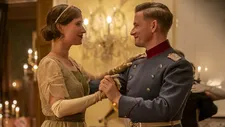 |
| Anton (Esben Smed) dancing with Anna (Rosalinde Mynster) |
BA: It’s true that in the novel it takes place in Austria because Stefan Zweig was from Austria. But I like so much that he, Anton, in order to restore some kind of dignity, or repair the damage he has done to her, whatever, he decides to go to war. Then there was a treaty between Denmark and France, so people from Denmark could voluntarily go into the First World War, so I use that as a tool to transport Anton into the First World War. I think it was a great ending. And in the very, very ending, of course I want to leave it up to the audience to decide if it's a good ending or bad ending.
AKT: We can make up our mind if we want the fairy tale. The editing was powerful and at times very abrupt. When I mentioned the deal with the devil, I referred to the moment when the father, the Baron, says to him: “You can have anything you desire. Anything!” He is not Mephistopheles, but he becomes him at that moment. It is just fabulous, a fabulous moment with great acting, too.
BA: Yeah, it's very powerful. And what a pressure on Anton! All of a sudden he has to decide. And he goes there, and I don't know if he's pretending what he does. But then because he did that, he has to lie for his friends. So it's very powerful.
AKT: On the technical side, you have some archival footage from the cavalry in 1914 or around that time. And then you cut to your scenes of the horses in formation. How was it filming that? Did you always want to do a mass scene of that caliber? It's not a battle scene, but it's practice for battle. Tell me about shooting that, please!
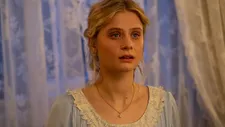 |
| Edith (Clara Rosager) in thought |
BA: When I have to make this decision to make a story like this, and I feel that the script is fine, then I go into the practical thing, and I always want to make it as cinematically interesting as possible. And then I saw this footage from the same period of Danish soldiers on the training ground, and I thought it would be a nice transition to see that it was actually real. I mean, it's a real world.
We saw the footage and then when we got into our film, either way, we did it. We were trying to make it look like the same thing. We just go from black and white into colour. But it was something I was thinking a lot about, how can we make it visually interesting? That is my job as a director.
AKT: Another moment that actually made me cry, was the reveal with Edith. I had read the novel years ago, so I had an inkling of what was going to happen, but you are fully involving us!
BA: Yeah. And it's very, very touching. All of a sudden, everything she believed in, even though she maybe had some doubts. When you make period films, I don't want to make just a costume drama. For me it's boring. It's flat. So the only way you can tell stories on film that take place in this period is to engage the audience quite soon.
If you are engaged with the conflict of the characters, then it doesn't matter; any costume is not important, the time is not important. It's really about a relationship. And for me this story is universal. I guess people all over the world in all times have had that kind of conflict. To feel sorry for somebody, to love, because you feel sorry or to really love. That kind of thing. We have all experienced that.
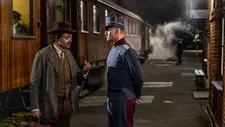 |
| Dr. Faber (David Dencik) with Anton (Esben Smed) at the train station in Copenhagen |
AKT: Although you say the costumes are not that important, they are beautiful. It is the same costume designer from The Pact [Anne-Dorthe Eskildsen] who dressed Karen Blixen.
BA: Yes. Of course it's important, but that's a more technical thing. But there's so many costume dramas, especially made in Britain, where for me it doesn't move! I don't get it when it's just so you can look at the costumes. But if you engage, then it supports the action. They support the story, but it's not the main thing. Right?
AKT: Yes, absolutely. I know what you're talking about. Sometimes it's just, okay, the costumes look nice. But there's no substance. I noticed that you like filming arrivals and departures, the in-between moments of people coming to a place or running away from a place. You include it several times, and it's so subtle and interesting how every time Anton, for example, leaves, runs away or arrives there, because every time it's slightly different. A theme that comes in waves.
BA: Yeah, because it tells something about his state of mind. It tells something about where he is. I mean, the first time he comes, he's a poor guy, and all of a sudden he sees this big castle, and it's a big thing, which tells something about his state of mind in that situation. But later also, when he runs away, it tells something about how frustrated he is, how angry he is with himself, and so on. So it's not a transportation scene, but the coming and going tells something about the character in this very situation.
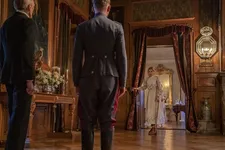 |
| Baron Løvenskjold (Lars Mikkelsen) with Anton (Esben Smed) watching his daughter Edith (Clara Rosager) walk |
AKT: Same with the perspective of the Baron, who's watching them from above. It's every time he might be thinking he's godlike watching from above, but he's also powerless.
BA: Because everything he's hoped for is for Edith to find a nice person. And that's also why the Baron puts so much pressure on Anton, because desperately he needs Edith to be happy. That's all he wants, then he can die. And it's not only to put pressure on, as you said before, but he is also the father.
AKT: The character of Anna I didn't remember at all from the novel. It’s set up well by you at the start, because we think maybe something else is going to happen than what is actually happening.
BA: She's in the novel, but it's also a storytelling trick. In the beginning, at least, that's the main reason why he's coming back to the castle because he's interested in Anna. But then, when he realised that she's getting married, but Edith is in love with him, he can't just leave. He can't go back. And then the father, of course, put so much pressure on him in order for him to keep coming back. But Anna, she's pretty important, because that's the reason why Anton is there.
AKT: The film is filled with decision making, be it even coffee or tea. He doesn't get out of it. Oh, I don't care, whatever you're having! No, he has to make decisions throughout, from the smallest ones, coffee or tea, to the biggest ones. It's great.
BA: Yeah, that's great. Plus, also it tells something about class. He’s in the world and it's a fairy tale all of a sudden. You’re surrounded by these wonderful people, and he gets tea. He never had tea before, I'm sure.
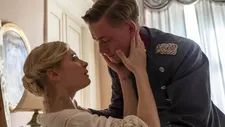 |
| Anton (Esben Smed) and Edith (Clara Rosager) |
AKT: You had me hooked with the film from the very first conversation with Aunt Lily about the horses, because of my own family lore. My great-grandfather was in the cavalry in World War I. He died before I was born. He had had a horse, and then much later on in the Sixties, when my father had to do military service, his grandfather was so concerned about the horse he was going to need. Where are we going to put the horse? We need a stable. We need to get him the horse! Of course there was no horse.
BA: We were scouting locations. I was visiting so many different castles and everywhere there were tons of paintings of horses, because, you know, today people have a Ferrari or other status symbols. But back then, the horse was the thing! So if you were very rich, you had a very, very expensive horse.
AKT: Last time we also talked about your Gianni Versace film. Is that still going?
BA: It still is. It hasn't been made yet, but they're still talking about it. I hope we will make it. It's a little tricky, but we hope we'll make it.
AKT: What else is coming up for you? What are you working on now?
BA: I just finished a big eight-hour series, The Count Of Monte Cristo. It will be screened in the United States this year. Now I'm doing a film in Italy. It's called Me, You. It's about a young boy, he's 13 from England, who's visiting the island of Ischia with his family, and he falls in love. The boy falls in love with a local girl who's 25. Of course they cannot have any kind of sexual relationship, it’s not about that. But it's a very, very beautiful love story between this boy and this girl. So that's what I'm supposed to do in September this year.
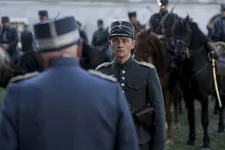 |
| Colonel Krabbe (Kurt Dreyer) addressing Anton (Esben Smed) |
AKT: So you're going to film on Ischia?
BA: Have you been there?
AKT: Yeah!
BA: It's lovely, isn't it?
AKT: Lovely. It's a great spot! That sounds wonderful. Well, thank you for this. I hope we can talk about the Ischia film when that is done. Was The Count Of Monte Cristo a book you loved as a child?
BA: I read it when I was so young, and then I read it again when they asked me if I was interested. And it's a great story. Yeah, you know these kind of big epic stories. I also think that this film, The Kiss, has an epic quality. That way of writing, you see, maybe Jonathan Franzen can do it. But you rarely see this kind of big-scale writing where they have a very strong theme and strong narrative forces.
AKT: We need those. You picked Karen Blixen, Stefan Zweig, Alexandre Dumas for your films for a reason. Thank you!
BA: Thank you! Take care, bye!
The Kiss is in cinemas in the US.





















